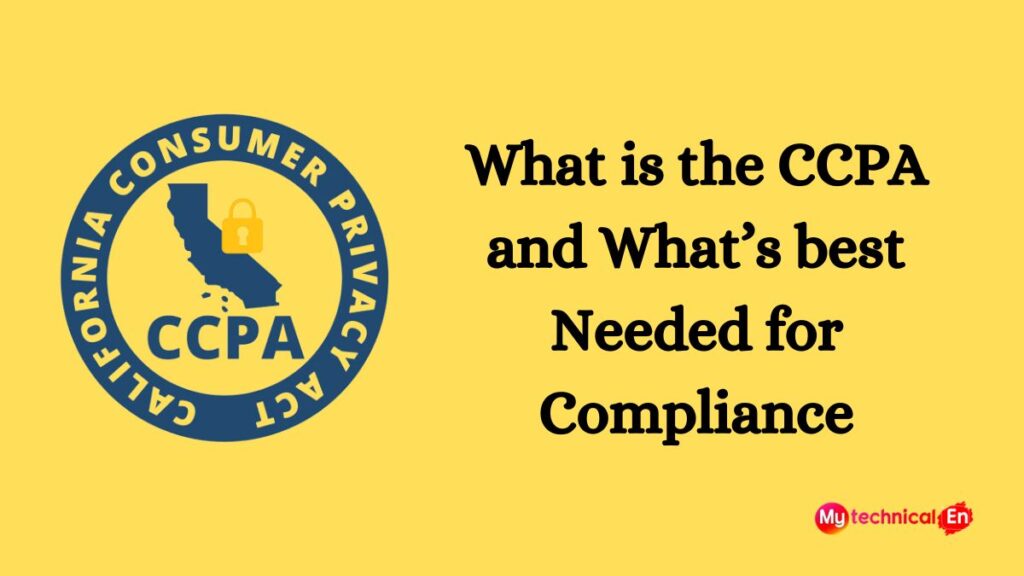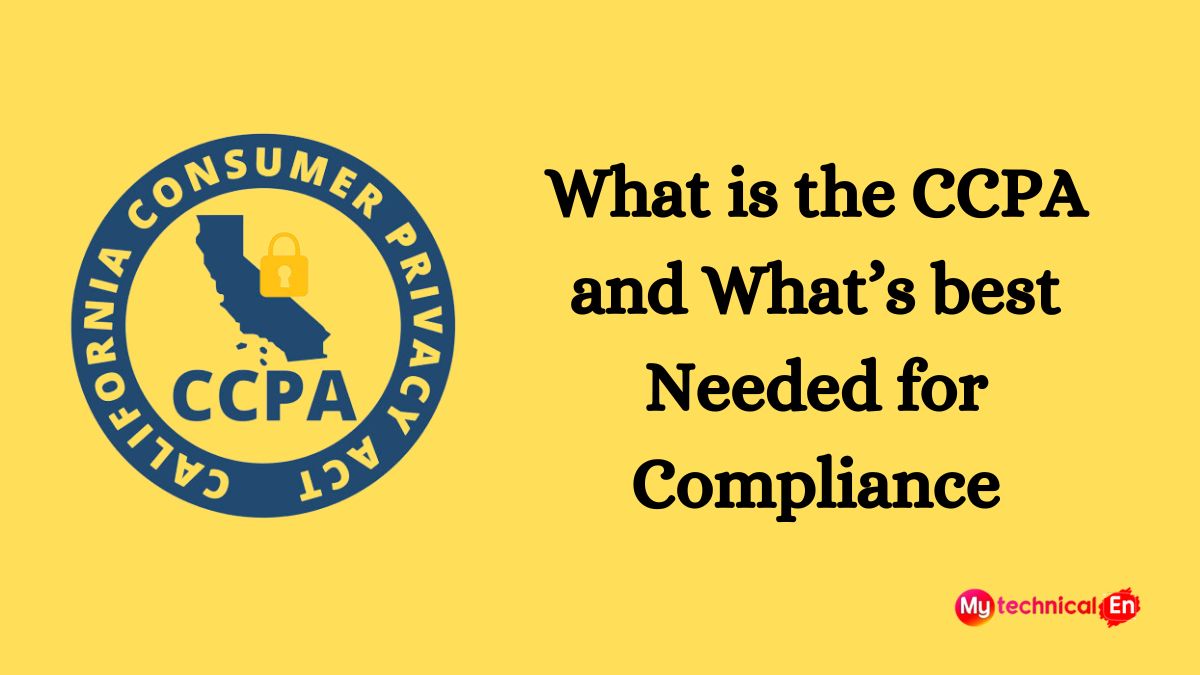What is the CCPA:- The protection of personal data has become paramount. The California Consumer Privacy Act (CCPA) is a crucial piece of legislation that empowers consumers and places responsibilities on businesses. In this article, we will delve into the depths of the CCPA, understand its significance, and outline the essentials for compliance.
Understanding the CCPA
The CCPA (California Consumer Privacy Act), short for California Consumer Privacy Act, is a landmark privacy law that came into effect on January 1, 2020. It grants California residents enhanced control over their personal information, providing them with the right to know what data is being collected and the ability to opt-out of its sale. This law applies to any business conducting activities in California and meeting specific criteria, regardless of where the business is based.

What is the CCPA Key Provisions of the CCPA
- Consumer Rights: Under the CCPA, consumers have the right to request access to their personal information, request its deletion, and opt-out of the sale of their data.
- Business Obligations: Businesses are required to disclose data collection practices, provide a “Do Not Sell My Personal Information” link on their websites, and maintain reasonable security measures to protect data.
- Opt-In for Minors: For consumers under 16 years old, businesses must obtain opt-in consent for the sale of their data.
- Non-Discrimination: The CCPA prohibits businesses from discriminating against consumers who exercise their rights under the law.
What’s Needed for What is the CCPA Compliance
Ensuring compliance with the What is the CCPA is essential for businesses to avoid potential legal consequences. Here are the key steps and considerations to meet CCPA requirements:
1. Data Inventory and Mapping
To comply with the What is the CCPA, businesses must understand what personal data they collect and where it resides. Creating a comprehensive inventory and data map is the first step.
2. Update Privacy Policies
Review and update your privacy policy to align with CCPA requirements. Ensure that it includes information on consumer rights and how to exercise them.
3. Data Access and Deletion Requests
Establish processes to respond to consumer requests promptly. This includes providing access to personal data and deleting it upon request.
4. Employee Training
Educate your staff about theWhat is the CCPA and its implications for your business. Properly trained employees are essential for compliance.
5. Vendor Management
If you share consumer data with third-party vendors, ensure they also comply with CCPA regulations. Review and update contracts as necessary.
6. Security Measures
Implement robust security measures to protect personal data from breaches or unauthorized access. Encryption, access controls, and regular security audits are vital.
Certainly! Let’s expand on the topic of CCPA compliance and its significance:
The Significance of CCPA Compliance
Compliance with the CCPA is not merely a legal requirement; it is a fundamental step towards respecting the privacy and data rights of individuals. Here are some key reasons why CCPA compliance is crucial:
1. Protection of Consumer Rights
The CCPA empowers consumers by giving them more control over their personal information. It ensures that individuals can access the data companies hold on them and have the option to opt-out of its sale. This transparency and control over personal data are vital for protecting consumer rights.
2. Avoiding Penalties and Legal Troubles
Non-compliance with the CCPA can result in significant fines and legal troubles for businesses. Fines can range from $2,500 to $7,500 per violation, and in the event of a data breach, consumers can file civil lawsuits. Compliance is not just good practice; it’s a means of avoiding costly penalties.
3. Building Trust and Reputation
In an age where data breaches and privacy scandals make headlines, consumers are increasingly concerned about how their data is handled. Demonstrating CCPA compliance can help build trust with customers. It shows that your business takes data privacy seriously and is committed to protecting their information.
4. Preparing for Future Regulations
The CCPA is just one of many data privacy regulations emerging worldwide. By complying with the CCPA, your business is not only meeting current requirements but also preparing for the possibility of similar regulations in other regions. This proactive approach can save time and resources in the long run.
5. Enhancing Data Security
Compliance with the What is the CCPA necessitates the implementation of robust data security measures. These measures, such as encryption, access controls, and regular security audits, not only help with compliance but also enhance overall data security. This can prevent costly data breaches and protect your business’s reputation.
The California Privacy Rights Act (CPRA)
It’s worth noting that the What is the CCPA is not static. The California Privacy Rights Act (CPRA), which builds upon the CCPA, introduces even more stringent privacy protections and enforcement measures. Some key provisions of the CPRA include the establishment of a dedicated enforcement agency and enhanced rights for consumers, such as the right to limit the use of sensitive personal information.
The CPRA will be phased in gradually, with full implementation expected by 2023. Businesses need to stay informed about these changes and adapt their practices accordingly.
CCPA compliance is not just about ticking legal boxes; it’s about respecting consumer rights, safeguarding data, and building trust. By following the guidelines outlined in this article and staying informed about evolving regulations like the CPRA, businesses can navigate the complex landscape of data privacy while ensuring the protection and trust of their customers.
Must read:-
- What Is File Security? Best Way’s to Comprehensive Guide in 2023
- Best 6 Tips to Keep Families Safe Online in 2023
- What Are Internet Cookies? Best way’s to defination in 2023
What is the CCPA related [FAQs]
Q: What penalties can businesses face for CCPA non-compliance?
A: Businesses can be fined up to $7,500 per violation, and consumers can file civil lawsuits in cases of data breaches.
Q: Is my small business exempt from the CCPA?
A: The CCPA applies to businesses that meet specific criteria, including those with an annual gross revenue of $25 million or those that handle personal information of 50,000+ consumers.
Q: Can consumers opt out of the sale of their data even if they are not California residents?
A: Yes, the CCPA allows any consumer, regardless of their location, to opt out of the sale of their personal information by businesses covered by the law.
Q: What should I do if my business is not yet CCPA-compliant?
A: Start by conducting a thorough compliance assessment, then follow the steps outlined above to achieve compliance as soon as possible.
Q: Can CCPA compliance benefit my business in any way?
A: Yes, beyond avoiding fines, CCPA compliance can enhance your reputation, build trust with customers, and demonstrate your commitment to data privacy.
Conclusion
In the era of digital data, the What is the CCPA stands as a beacon of consumer rights and data protection. Understanding its intricacies and ensuring compliance is not just a legal obligation but a way to foster trust and credibility in the digital landscape. By following the steps outlined in this article, you can navigate the CCPA effectively and ensure that your business respects the privacy of its customers.
